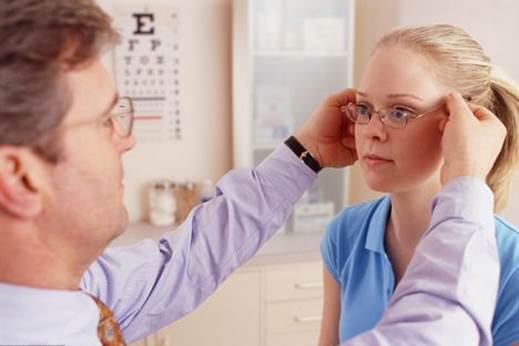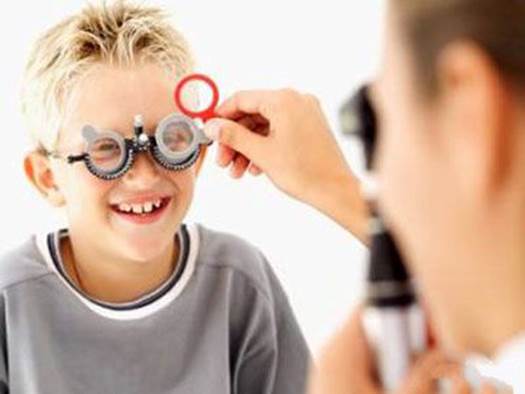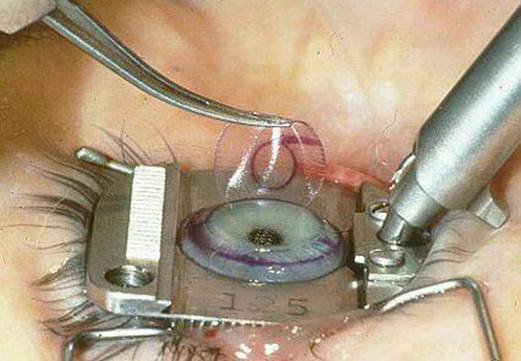Below are the causes and precautions for
short-sightedness.
The short-sightedness in children is
increasing dramatically and becomes a serious worry of parents. According to
the optometrists, the school myopia has the rapidly rising trend.
Its main cause is not fully understood. However, for a long time of research,
experts realize that work which require your eyes to regulate for such a long
period (have a look at small-sized numbers, read book, deal with the computer
monitor…) in ill-lit conditions have the connection with short-sightedness.
Besides, the genetic element, nutrition, babies who are born earlier than usual
demonstrate their relation with this disease.

The
short-sightedness in children is increasing dramatically and becomes a serious
worry of parents.
What is short-sightedness?
Short-sightedness is a refractive error
which has influence on the eye focusing mechanism. Because your eyeball is
long, the beam of ray will focus too far in front of the retina. As a
consequence, those close objects are clear whereas distant object is blurred.
Children is likely to be short-sighted because of
these causes
Children
have a lack of sleep or spend less time sleeping
Especially from 7-9
years old and 12-14 years old, if they sleep less or have not enough time to
sleep owing to the fact that their parents force them to study too much, they
are likely to be short-sighted.
Children
were underweight at birth
The vast majority of babies - who are born
under the weight of 2.5kg – are short-sighted as soon as they come to their
teenager.
Children
were born earlier than expectation
Children who are born earlier more than 2
weeks have the tendency of being short-sighted when they start to go to school.
Short-sighted parents pass down short-sightedness to their children and this
influence is associated closely with their parent levels. As usual, if the
parents are short-sighted less than 3 diopters, the pass-down ability is small.
In case they are more than 6 diopters, the percentage of passing down this to
their children is 100%.
Children
watch TV too close
If children spend 2 hours every day
watching TV, with the distance from their eyes to the TV is less than 3 meters,
their visions will be lost dramatically.

One
of the vital points of vision is proper light …
Precautions
One of the vital points of vision is proper
light. Make sure your children have the necessary light when they read books or
study. Either too strong or too dim light make their eyes tired, these above
mentioned situations should be avoided. You had better not let them read books
or write for such a long period of time. Do not allow them to watch TV
continuously in 2-3 hours. Pay attention to their distance in reading as well
as writing. The distance from their eyes to the page should be approximately 30-50
cm. The good posture should be straight. During their writing, remind them of
not letting their heads slanting or not reading books when lying as well as not
eating while reading magazines. Cast an eye on their nutrition. Provide them a
wide range of food which includes protein along with vitamins. The harder and
more intensely they study, they more you have to focus in adding more nutrition
in their diet and practicing exercises as well.
Children should have an eyesight check-up
at least once a year to make sure their appropriate eye vision development. In
case you doubt that your children are short-sighted, take them for an eyesight
check-up right away and not let them become worse. The most suitable moment for
an eyesight check-up is before they go to school. Blurred eyes and vision which
are not detected soon can result in the blindness in the future, especially in
the essential stages of the vision development from 6 to 9 years old.
Who should have a Lasik surgery to cure short-sightedness
Lasik is a method in order to treat the
refractive errors by using the refraction of a laser ray. The Lasik surgery
definitely won’t hurt you in and after the surgery. In terms of theory, after
the Lasik surgery, the patients are about to have better visions. However, it
doesn’t take into granted that a patient after a successful surgery can read
newspaper and magazines in such ill-lit environment, spend hours in front of
the computer… without any concern about the ability of having the refractive
errors again. Besides, not everybody’s short-sightedness can be cured by Lasik
surgery. The Lasik surgery is such a significant revolution in the refractive
surgery owing to its accuracy as well as its benefit of quick vision recovery
after the surgery. Nevertheless, Lasik surgery is not always applicable for all
short-sighted patients. As a result, if you don’t want to wear glasses, another
choice for you to take part in some activities is a pair of contact lenses. If
your work requires you to wear neither glasses nor contact lenses, then you can
choose to be cured by Lasik surgery.

Lasik
surgery is not always applicable for all short-sighted patients...
Age
For those who are older than 40 years old,
the regulation ability of their eyes will decrease with time; in other words, the
diopters of long-sightedness increase. This increase relies on their health as
well as their eye status. In case a short-sighted person who is older than 40
years old, he will cost twice (one for the Lasik surgery and one for the later Phaco
surgery) and the accuracy of their eyes after these surgeries is not high at
all. As a result, if the short-sighted patient is more than 6 diopters and
older than 40 years old, he should wait for a period of time until his cataract
occurs, then these problems can be solved in just one surgery with more
accuracy level.
Short-sighted diopters
If your short-sightedness is between 1 to 2
diopters and you don’t need to use a pair of glasses, then you don’t need to
have surgery; owing to the fact that when you are 40 years old, a pair of
long-sighted glasses is not necessary for you. If yours is more than 6
diopters, pay attention to tracking your diopter of short-sightedness and keep
in your mind that surgery can only be carried out once your diopter is stable.
The rate of recurrent short-sightedness will be higher than those who are less
than 6 diopters. The conditions for Lasik surgery are older than 18 years old,
it will deliver the best result when the diopters of short-sightedness is below
10 diopters, under 40 years old and disorder vision is less than 5 diopters.
Furthermore, the patients who will be cured
by Lasik surgery are required to have stable refractive ability for at least 6
to 12 months (in a year, their increasing diopters aren’t bigger than 0.75) and
have neither acute nor chronic diseases related with their eyes such as:
conjunctivitis, inflammation cornea, uveitis, glaucoma, conical cornea… as well
as no physical disease. This method of surgery is not applicable towards
pregnant women or during their breastfeeding time. Once you are short-sighted,
you had better go to meet the optometrists; in case they consult you not to
have surgery, it is a good advice which you should follow. Do not put too much
hope in this Lasik method and try to find somewhere to have surgery then there
might be some significantly damaged results. There are cases in which their
both eyes are blind after the Lasik surgery.